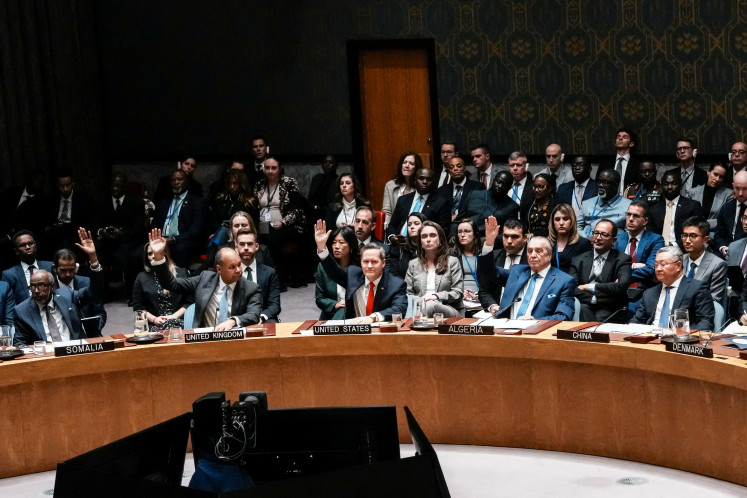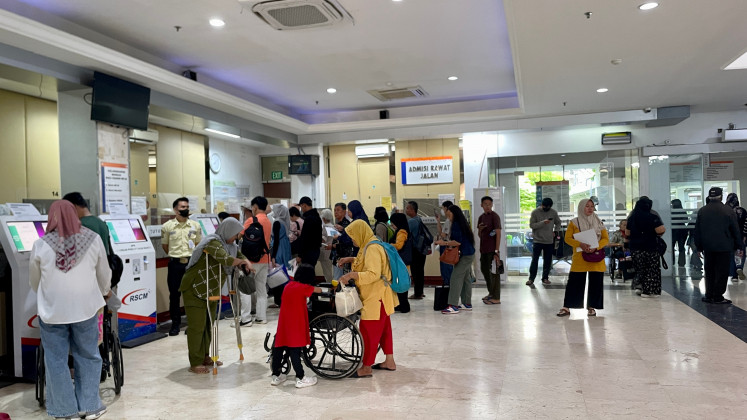Popular Reads
Top Results
Can't find what you're looking for?
View all search resultsPopular Reads
Top Results
Can't find what you're looking for?
View all search resultsAmin Abdullah: Popularizing ‘kakula’ globally
JP/Ruslan SangadjiSmall and medium-sized gongs arranged in harmony, popularly known as kakula, is thriving among members of the indigenous Kaili community in Palu, Central Sulawesi, adding color to Indonesia’s multifaceted cultural mosaic
Change text size
Gift Premium Articles
to Anyone
JP/Ruslan Sangadji
Small and medium-sized gongs arranged in harmony, popularly known as kakula, is thriving among members of the indigenous Kaili community in Palu, Central Sulawesi, adding color to Indonesia’s multifaceted cultural mosaic.
Commonly played during wedding ceremonies and custom rituals, kakula is part of the gong culture spreading in Southeast Asia from southern Philippines to southern Sumatra. Such instruments are also found in Bolaang Mangondow, North Sulawesi, Kalimantan, Sumatra, Maluku, Sabah, Sarawak Malaysia and Brunei Darussalam.
Amin Abdullah, an artist from Palu who earned his master’s degree in Asian studies at the University of Hawaii in Manoa, US, has further developed kakula by creating a modern blend of traditional music and popular music. In Palu he formed a kakula group called the Modero Palu Ensemble.
In the hands of Amin, kakula has not only been promoted in Palu but it has also been introduced in the US, Latin America and other parts of Asia. With perseverance, Amin managed to invite several artists from the US, Argentina, Japan, Vietnam and also Indonesia to join him.
“I invited them to play kakula in a group named The Hawaii Kakula Ensemble,” said Amin. They succeeded in their Kakula Concert at the University of Hawaii and Gamelan Ensemble Concert in Honolulu, Hawaii. The shows in November 2005 helped raise funds for orangutan conservation and victims of the tsunami in Aceh.
Amin’s new kakula creations have not replaced traditional music, though. “By using traditional music as the basic idea, innovations serve to symbolize tradition and modernity combined. Such creations constitute a transformation of music played in daily life into that played on stage,” he indicated.
The city of Maasin, the Philippines, recently witnessed the capability of his Modero Palu Ensemble. In February 2013, this Palu musical group hypnotized locals at the Philippines Tuonog Tugan Festival.
Loen M. Vitto, general coordinator of the festival, said Modero Palu had been invited to provide an opportunity for students from three Philippine cities, Dipolog, Maasin and Iloilo, to acquaint them with traditional Indonesian music from Central Sulawesi.
“Modero Palu Ensemble’s participation in Tuonog Tugan helped create a distinctive atmosphere. Foreigners usually recognize Indonesian music only through Javanese and Balinese gamelan. But now they see that Central Sulawesi has its own music with a modern twist,” he pointed out.
Mayco Santaella, international manager of the Modero Palu Ensemble, noted that Amin’s group had nicely intertwined traditional music with modern sounds. “The group doesn’t treat tradition as a separate element. Members of the audience were invited to play, it’s remarkable,” praised Mayco.
Indeed, Amin and his peers in a number entitled “Pompaura” invited four audience members to participate in music-making by using pare’e, a traditional bamboo instrument that produces vibrations. “With your music, tradition is inseparable from present conditions. Modero Palu brings them together. The audience is not at all distant, which is very important,” said a female coordinator.
The enthusiastic response led to a dinner invitation from the Mayor of Maasin, Mariano M. Malones. In his message, the mayor expressed his gratitude for the ensemble’s visit to the city. “It’s the first international festival we’ve organized here. We’re very pleased. You greatly entertained our citizens,” he said.
A local primary school teacher even made the effort to visit Amin and his group at their hotel only to ask for a copy their album that was produced by the Culture and Tourism Office of Palu, to be played at his school. “I’m going to make my students listen to your music before class begins,” he told Amin.
Following the Maasin tour, Modero Palu proceeded to Manila’s University of the East-Caloocan, St. Paul University and the University of Asia and the Pacific to fulfill other invitations.
Ramon P. Santos, president/executive director of the University of the Philippines’ center for ethnomusicology, described Philippine music as being mostly westernized. Conversely, Philippine traditional music similar to kakula was limited to internal communities for rituals. “You’ve managed to merge traditional and modern elements.
It’s wonderful,” he lauded.
Since 1997, the Central Sulawesi provincial administration has sponsored the development of modern kakula music initiated by Amin. This music has become the identity of the Kaili community.
Among other instruments incorporated with the traditional music include tambourines, cymbals, lalove (Kaili community flutes), large drums and other shallow drums.
Kakula first underwent growth during the post-independence period. The government, through its cultural institution, has since expanded the function of traditional kakula to cover not only ceremonial occasions but also regional dance and song accompaniments as well as new compositions.
Western influence has thus also pervaded more recent kakula creations. However, whatever the new version is called, Amin, with his modern touch has successfully presented kakula to global forums, and the government should keep boosting it as one of Central Sulawesi’s tourist attractions.
















